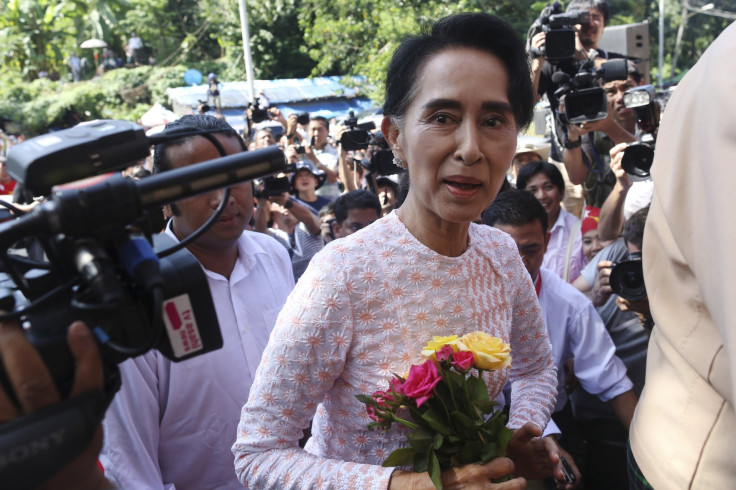Myanmar Election: Suu Kyi Congratulated By President, Military Commander

UPDATE: 12:24 a.m. EST -- U.S. President Barack Obama congratulated the president of Myanmar Thein Sein for holding “free and fair” elections, according to reports citing a spokesman for Myanmar’s president.
Myanmar’s election commission said Thursday that the opposition National League for Democracy (NLD) party, led by Aung San Suu Kyi, had gained more seats as the votes from Sunday’s elections continue to be counted.
Original story:
Myanmar’s president and its military chief congratulated Aung San Suu Kyi on Wednesday for her party's apparent victory in last Sunday's election. It was the latest sign there will be a peaceful transition after more than 50 years of military rule.
“The government will respect and follow the people’s choice and decision, and work on transferring power peacefully according to the timetable,” the New York Times reported President Thein Sein as saying. He congratulated Suu Kyi for “gathering the support of the people."
The military “congratulates the National League for Democracy in getting a majority of seats” among those where a winner has already been declared, the Times reported a statement from the office of Gen. Min Aung Hlaing as saying. Both sides agreed to hold negotiations after the election commission announces the final results of the vote, expected later this month.
Earlier on Wednesday, Suu Kyi has asked to meet with the two leaders, and the Shwe Mann, speaker of the lower house. Shwe Mann quickly said yes.
“Implementing the people’s desires calmly after Election Day is very important for the country’s dignity, and for our people’s peace of mind,” Suu Kyi said in her letters to the three men. “I would like to invite you to discuss reconciliation next week at a time of your convenience."
As of Wednesday night, Suu Kyi's National League for Democracy has won 179 of the declared seats in the lower house, with 17 going to the ruling Union Solidarity and Development Party and 20 to smaller parties, according to Myanmar Times. For the upper house, the count was 77 to 4.
The trend so far may allow her to get a majority in the 440-seat lower house despite the military's right to fill 110 seats -- 25 percent. Still, she will need to work with the military and its allies because -- aside from their reserved parliamentary seats -- they will retain control of three key departments: Defense, Home and Border Security.
The parliament will elect a president by March next year. Suu Kyi, who retained her own seat in Kawmhu, Yangon, isn't eligible because of a law that bars people who are married to or closely related to foreigners. Suu Kyi's late husband was British, as are their two sons. She says she will rule as party leader above the president, whom she will choose.
“This was not an election of a government,” the Times quoted Thant Myint-U, a historian and sometime government adviser, as saying earlier this week. “It was an election for a spot in a shared government with the army.”
If there is a peaceful turnover, Myanmar will have its most democratic government since 1962, when the military staged a coup. In 1990, the military called an election that Suu Kyi and her allies won. But the military then refused to hand over power, putting Suu Kyi under house arrest instead for most of the next 20 years. Under house arrest, she won the Nobel Peace Prize and became known as an "icon of democracy."
© Copyright IBTimes 2024. All rights reserved.











